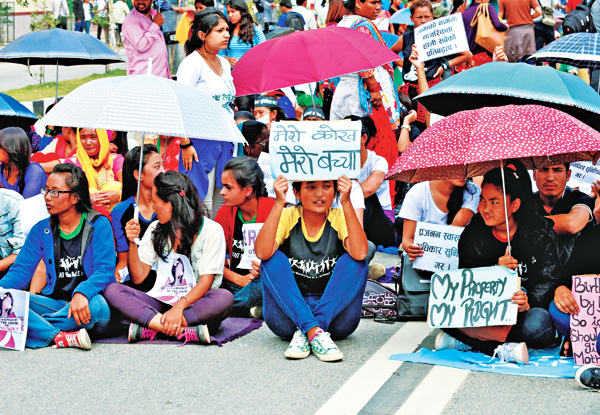Fears grow over Nepal’s ‘anti-women’ statute
KATHMANDU, August 7
Nepal’s proposed new constitution has sparked fury from women who say their citizenship, property and other rights are being curtailed by the document designed to draw a line under centuries of inequality.
Constituent Assembly members tabled a draft in the CA in June shortly after bickering political parties struck a historic deal on the long-awaited charter.
But a series of sometimes violent protests have since hit the county, with activists saying the charter has failed to address a string of concerns.
Forty-year-old shop owner Rama Bista says the charter poses a major step back for women, in a country that has long favoured men. Bista, who is married to an Indian man based in Nepal, has spent the last four years trying to secure citizenship for her two sons — their legal right under the current constitution.
READ ALSO
“I cannot even speak of some of the things I’ve been told. They tell me my children are not Nepali, that I should go to my husband’s country,” Bista told AFP.
But Bista’s already tough struggle is set to become impossible under the new charter which bars single parents from passing on their citizenship to their children and additionally says both parents must be Nepalis.
It will overturn a 2006 act that says children are eligible for citizenship as long as one parent is Nepali.
Activists say the move could leave a million people stateless and will disproportionately affect women, who account for the vast majority of single parents in Nepal.
Bista says she is anxious about the future for her sons since citizenship is needed to get anything in Nepal from a driving licence to a bank account.
The draft also makes it easier for a Nepali man to confer citizenship on his foreign spouse, while a Nepali woman needs to be married 15 years to her foreign husband before even being allowed to apply.
Campaigners fear provisions could also be used to prevent Nepali wives or widows from inheriting property unless stipulated in the deceased’s will.
Instead of specifying that daughters can inherit ancestral property, the draft vaguely says “all children”. Activists are concerned this could be interpreted as sons and unmarried daughters only — the wording used in the country’s civil code.
The draft removes the explicit reference in the current constitution to “sons and daughters”.
“The draft dismisses the identity of a woman and reflects our country’s patriarchal mindset that seeks to maintain discriminatory practices,” said Sapana Pradhan Malla who heads pressure group the Forum for Women, Law and Development.
Lawmakers have brushed off the protests and campaigners’ concerns, saying the draft is not intended to discriminate against anyone.
“The constitution is not anti-women,” said ruling coalition lawmaker Bhim Rawal. “Every country has provisions to protect its nationality and sovereignty,” he said.
But Bista and others remain fearful the charter will close the door on rights they had fought years to get. “We call our country our motherland, and yet a mother’s identity has no value,” she said.






